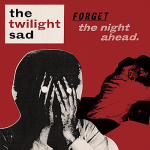|
|
 |
Dusted Reviews
Artist: The Twilight Sad Album: Forget the Night Ahead Label: FatCat Review date: Sep. 23, 2009 |

|
|
|
 |
After two years, a stopgap EP and a generous collection of b-sides and unreleased material, Scotland’s Twilight Sad have returned with a highly anticipated sophomore album that once again seeks to find the common ground among Arab Strap, My Bloody Valentine and life as a disaffected adolescent. For casual fans and onlookers, Forget the Night Ahead will be a satisfying listen that carries forward the momentum they’ve built since their self-titled EP in early 2006. James Graham’s easily identifiable Scottish burr is as thick as it’s ever been. The guitar noise and buried melodies are on prominent display. Mark Devine’s muscular drumming makes its presence known immediately. In short, you give it a listen or two and think everything’s in its right place.
So, what’s the problem? Well, it started when the band promised that Forget the Night Ahead would be “noisier and bigger.” They weren’t kidding – it is colossal. Even for a band that shot for your heart when they weren’t shooting for your earplugs on Fourteen Autumns & Fifteen Winters, these 11 songs are an example of what happens when you try to outdo your first album by making the second one exactly the same, except with more everything.
Devine’s creative drumming has never been buried in the mix, but opener “Reflection of the Television” exudes perfectly what this album is all about. Droning noise from god knows which one of Andy MacFarlane’s effects pedals creates the mood for Devine to enter with his pounding bass and toms. The song sounds huge before it ever kicks into full-on feedback holocaust-mode three minutes in. It’s a tremendously powerful piece of music, among the best in a steadily growing catalog, but the unholy roar that feels so special at the end of the song will be a distant memory by the time you’ve gotten to “At the Burnside” 45 minutes later.
“I Became a Prostitute” is the first single and, while there’s a melody you can hum to somewhere in there, the ambient noise dominates your headphones. The chorus of second single “Seven Years of Letters” is the same way. “Made to Disappear,” ditto. The songs may start off differently, but with only a single exception (“Scissors” is a noisy instrumental interlude midway), they all wind up in the same place: Graham trying to beat the cymbal-crashing, pedal-laced cacophony of his bandmates.
Proof comes in the two songs that survived Killed My Parents and Hit the Road, “That Room” (formerly “Untitled #27”) and “The Neighbours Can’t Breathe” (“Untitled #28”). These were arguably the two best songs from that album, even in raw demo form. “That Room” adds piano and thudding drums that would overwhelm the original acoustic version, while “The Neighbours Can’t Breathe” takes the original mix and make it impossibly noisier. One of the ringing guitar lines from “Untitled #28” is still here, but now they’ve added a mellotron for that added touch of melodrama and, of course, noise.
If your ears aren’t reduced to deafness after one listen, you’ll make out one moment when more is less and the Kilsyth quartet’s maximal tendencies generate a subtle moment of beauty almost in spite of themselves: Graham mumbles, “You and I will bury them” on the climax to “Interrupted” while a backing chorus sings a higher pitch. The line sticks with you long after the album is over; the trouble is, this album shouldn’t suffer from so few key moments.
The songs are here, and they are great. It’s all in what happened when they finished the writing. I appreciate the cosmic joke that Paul Savage mixed this album, but savage noise is only effective when deployed with tact. The band seems to have lost this deftness of touch in their quest to make an album version of the “You Made Me Realise” experience. The Twilight Sad’s second proper album is an encouraging step in the wrong direction. Perhaps the sensory overload of these recordings will encourage a more conservative route in the future.
By Patrick Masterson
|







